Stormont talks: Sinn Féin calls for government intervention
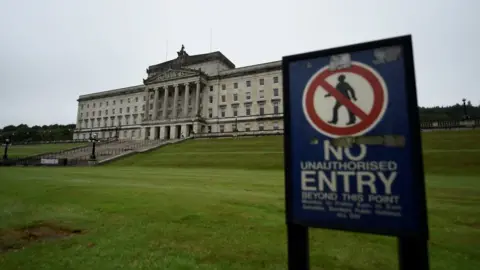 Reuters
ReutersSinn Féin has called on the British and Irish governments to intervene to help break the deadlock in Stormont's power-sharing negotiations.
John O'Dowd said they must inject "leadership and energy" into the talks.
But the DUP's Edwin Poots said that "one party cannot deliver this process on its own".
Talks to restore Northern Ireland's devolved government are going down to the wire, with the parties having until 16:00 BST on Thursday to reach a deal.
If agreement is not reached by the deadline, which is set down in law, Northern Ireland faces the prospect of a return of direct rule from London.
'Expect very late night'
The negotiations involve the five main Northern Ireland parties and the UK and Irish governments, although a deal is dependent on whether the two biggest parties, the DUP and Sinn Féin, can resolve their differences.
These include republican demands for a stand-alone Irish Language Act and rights for the LGBT (gay, lesbian, bisexual, transgender) community.
The DUP has criticised the Irish government for supporting Sinn Féin's demand for an Irish Language Act.
In a statement, the party said: "Only last week the Irish government lectured our United Kingdom government on the importance of observing neutrality when dealing with Northern Ireland parties.
"Yet by publicly declaring its support for Sinn Féin's position in negotiations, the Irish government has undermined its own credibility as being neutral."
Round-table talks involving the five party leaders were due to take place on Wednesday but the BBC understands the DUP and Sinn Féin did not show up.
Irish Foreign Minister Simon Coveney tweeted: "Stormont talks continuing - efforts intensified to find agreement on outstanding issues before tomorrow's deadline. Expect very late night."
Shortly after 17:00 BST on Wednesday, Sinn Féin's John O'Dowd said no compromise had been reached and he called on the governments to become more involved in the efforts to reach a deal.
"With less than 24 hours to go in these talks, the DUP have not moved to resolve the issues which brought down the institutions in January," Mr O'Dowd said.
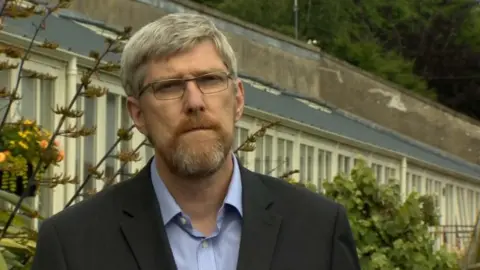
"Rights, equality and respect need to be resolved, they need to be implemented in legislation and we need to get to that position.
"There is now clearly an onus on the two governments to inject energy into these talks, to inject leadership into these talks and ensure that the outstanding issues are resolved in the timescale we have left to us."
However, the DUP's Edwin Poots said the party wanted to show "absolute respect for other people's language and culture" in respect of Sinn Féin's demand of an Irish Language Act.
Mr Poots also said that talks had been a "slow grind".
"We're trying to get to people's bottom lines so decisions can be made as to how we can move forward. We would like to do that tomorrow but that's up to others.
"Ultimately, one party can't deliver on this process on its own, it's going to be an engagement."
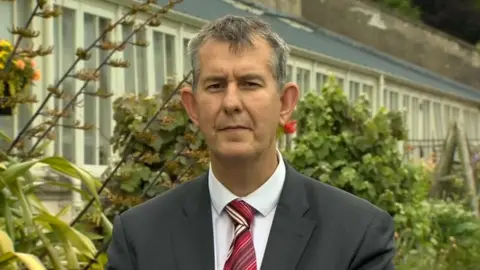
He added that the DUP were ready to establish government before the deadline and "if there's issues outstanding that we need to continue to work on, then we're happy to do that".
With no breakthrough reached by Wednesday evening, it would be very difficult to meet Thursday's deadline, according to BBC NI political correspondent Enda McClafferty.
"It appears there has been little or no progress made on the key issue which is emerging - the Irish Language Act," he told the BBC's Evening Extra programme.
'Real Madrid star'
Earlier, Northern Ireland Secretary James Brokenshire said that there would be serious implications if the Stormont parties could not agree a deal by Thursday's deadline.
Mr Brokenshire would not go into detail about any alternatives he might be considering if the talks fail.
He also denied the Tory-DUP confidence and supply deal would make it impossible for the government to maintain their impartiality in Northern Ireland.
He said he had not been part of those talks.
Speaking at Northern Ireland Questions in Westminster, Mr Brokenshire said he would not be on a liaison committee being set up by the Democratic Unionist Party (DUP) and the Conservatives.
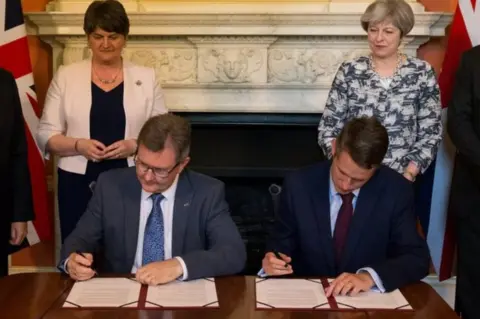 Reuters
ReutersUnder the "confidence and supply" arrangement, the DUP guarantees that its 10 MPs will vote with the government on the Queen's Speech, the Budget, and legislation relating to Brexit and national security - while Northern Ireland will receive an extra £1bn over the next two years.
While rival Stormont parties have largely welcomed the additional funding, concerns have been raised that the deal could undermine the peace process and devolution negotiations, with the UK government dependent on the support of the DUP.
The Scottish National Party said the DUP was holding a "sword of Damocles" over the government's head.
SNP MP Alison Thewliss joked that the £1bn deal meant each DUP MP was now worth more than the Real Madrid footballer Cristiano Ronaldo.
The new Shadow Northern Ireland Secretary Owen Smith said there was a danger that trust in the perception of the government's impartiality would be eroded.
He called on the government to publish the minutes of any meetings of the new liaison committee.
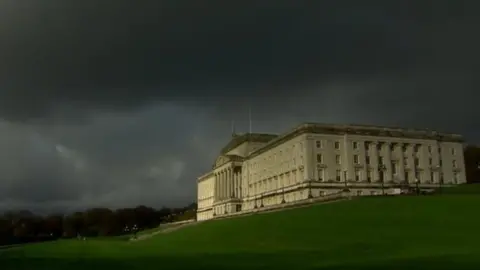
Northern Ireland has effectively been without a devolved government for almost six months.
Its institutions collapsed amid a bitter row between the DUP and Sinn Féin about a botched green energy scheme.
The late deputy first minister, Martin McGuinness, stood down in protest over the DUP's handling of an investigation into the scandal, in a move that triggered a snap election in March.
